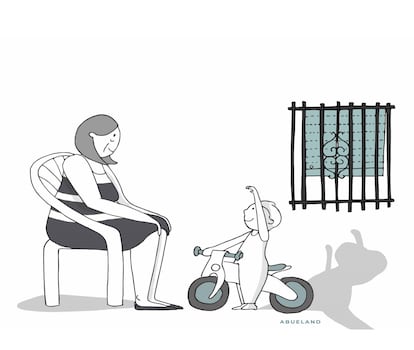‘The nuclear family model has overburdened grandparents’
Illustrator Joly Navarro talks to EL PAÍS about her project ‘Abueland,’ a series of cartoons that looks at the pressure placed on Spanish seniors to care for their grandchildren

For families today, having grandparents nearby is a lifeline. Even more so if they are present and “active” grandparents. Because parenting, especially in urban settings, has become a complex challenge in a society that only understands childcare as an individual issue, and one to be addressed with privatization.
Through the cartoon project Abueland (or, Grandparentland), journalist and illustrator Joly Navarro seeks to highlight the value of caregiving departing from the premise that “the personal is political.” In her 40 vignettes, she depicts “what seems insignificant and yet is essential for life to move forward” in order to make us reflect on the unseen work of grandparents – without whom it would be even more difficult to raise children in a world in which productivity takes precedence over quality of life. For the illustrator – who has launched a crowdfunding campaign to publish Abueland as a book – the way to find balance is to reconcile ourselves to a more sustainable and slower pace of life, but also to turn generational conflicts into a learning opportunity for one and all.
Question. Your first cartoon was inspired by your own journey into motherhood in 2018. Did your personal experience change your view of raising children?
Answer. I worked in the social sector for over 10 years, and that is where I learned about caregiving and where I began to come up with theories on it. However, the experience of motherhood definitely made me understand it. It’s not so much that my vision changed, but that I began to digest what I had assumed. Suddenly, all the people who had taken care of me throughout my life emerged very clearly and I experienced an intense need to appreciate and give value to what they had done.
I would say that in my case, motherhood connected me with all the women in history who have cared and continue to care for me. I felt part of it. And I discovered the way to contribute to this feeling of sisterhood was through illustration and reflecting on the crisis of caregiving.
Q. Abueland is a collection of 40 cartoons that focuses on the social era we are living in from a feminist perspective. How much is personal in these vignettes?
A. Each cartoon focuses on the everyday, on the details that may go unnoticed, on what seems insignificant and yet is essential for life to move forward. And I recognize myself in all of them. However, the situations I portray in the cartoons have not necessarily happened to me. They are a portrait of everyday situations that I observe, listen to and share; they are ones that concern me or that I find funny. They are situations that serve to address issues that are of immense social interest.
The phrase “the personal is political” perfectly defines what I was trying to convey with Abueland: that the care provided by grandfathers and grandmothers transcends the personal to become part of the public sphere.
Q. Many people between the ages of 50 and 70 and beyond provide their grandchildren with a large amount of care. In some cases, it is because they want to and in others, it is because they are forced to. There are also grandparents who are still working or live far away and cannot help even though they would like to. Parenting is not easy without grandparents. Are we aware of the role grandparents play in a country like ours?
A. Yayo Herrero, one of the most influential researchers in the ecofeminist field, talks about the difference in how caregiving duties were divided in the past and the way it is done now. Years ago, community, neighborhood and extended family networks were more common, and childcare was distributed in a balanced way. Now the nuclear family model makes this distribution more difficult and, consequently, grandmothers and grandfathers are overburdened.
Q. Particularly grandmothers...
A. Yes, in Abueland I flag up the role of grandmothers because it is older women, grandmothers, who continue to offer care, whether freely or otherwise. Childcare duties, throughout history, have been assumed by women and our society has undervalued them; this links to the feminization of poverty.
There is a cartoon in Abueland aimed at opening the debate on this situation called El Matrioskado. On the one hand, it is a play on words that prompts us to think about misunderstood matriarchies in which women continue to assume a disproportionate share of caregiving as well as making the decisions. The word also leads us to think about the impact of the patriarchal system. And finally, there is a parallel with the mechanism of a Matryoshka doll [wooden dolls of decreasing size placed one inside another]: if we put it together, we can’t see the care that takes place behind closed doors.
Raising children without a network leaves less time for self-care, which can often lead to frustration and stress
Q. Those of us who don’t have help from grandparents have built new support networks with friends who have become family. Is it possible to raise healthy children without a network?
A. There’s a quote from Carolina del Olmo in her book ¿Dónde está mi tribu? [or, Where’s My Tribe?] that says, “Only gods and monsters can be alone; people can’t.” I think we forget the social nature of parenting and the importance of collectivizing caregiving duties. At least in the city, this is exacerbated by the scarcity of intergenerational spaces conducive to meeting and play.
Raising children without a network leaves, among other things, less time for self-care, which can often lead to frustration and stress. Having people willing to lend a hand allows us to disconnect and so connect with ourselves. But not only that. It allows us to learn from the experiences of others and get a different perspective on motherhood or parenthood. It helps us to understand that there are different ways of parenting and therefore that we should be more respectful. In short, it involves learning that improves the quality of our lives and that of our children, who will internalize the importance of bonding and cooperation.
Q. Is it possible to achieve a balance between paid work and childcare duties?
A. I think it is possible to reconcile ourselves to a more sustainable and leisurely pace of life that allows for the coexistence of paid or unpaid work and caregiving. But this requires revising the gears of a system of production that is incompatible with enjoyment, rest, fairness and care. On the other hand, of course, this is very complicated and many pieces of what is established would have to be moved. And that not only depends on personal change, but also on large-scale change that is slow, and for which there is generally little inclination.
The general solution that we are accepting as valid is the privatization of childcare. But we need a broader long-term vision that will allow us to rebuild a fairer more accessible care system for everyone.
Q. Another question is whether we let grandparents choose their own approach to caring for our children or if we pressure them to act the way we think they should.
A. [US anthropologist] Margaret Mead said back in the 1970s that we had not thought enough about the pressure we put on grandparents to stay out of the way – not to interfere, not to coddle, not to insist. In general, I think we demand too much of ourselves and the pressure we put on ourselves is passed on to our fathers and mothers.
We live in an era of information overload and speed in which excellence is over-valued. In such an environment, we sometimes don’t even know how we want to act and we have to make an effort to tune in to our beliefs. On the other hand, not being able to do everything can be frustrating and the accompanying discomfort can spill over into the family.
Q. How do you find the balance between consistency and a more each-to-themselves approach?
A. In my case, I have chosen to put the bond and the emotional well-being that Abueland brings to my children above all else. It is true that sometimes conflicts arise, but in those cases, I think it is important to talk and listen with a good dose of willingness to understand where each one of us is coming from. I also find it interesting to appreciate what the grandparents’ experience brings to the children. In fact, it is my father who tells them what life was like in the countryside and what the work consisted of. He tells them about seasonal vegetables and teaches them how to plant fruit trees. In short, he connects them to ways of doing things that I have not experienced.
Abueland’s proposal is to approach generational conflicts with humor and, if possible, turn it into a learning opportunity.
Tu suscripción se está usando en otro dispositivo
¿Quieres añadir otro usuario a tu suscripción?
Si continúas leyendo en este dispositivo, no se podrá leer en el otro.
FlechaTu suscripción se está usando en otro dispositivo y solo puedes acceder a EL PAÍS desde un dispositivo a la vez.
Si quieres compartir tu cuenta, cambia tu suscripción a la modalidad Premium, así podrás añadir otro usuario. Cada uno accederá con su propia cuenta de email, lo que os permitirá personalizar vuestra experiencia en EL PAÍS.
¿Tienes una suscripción de empresa? Accede aquí para contratar más cuentas.
En el caso de no saber quién está usando tu cuenta, te recomendamos cambiar tu contraseña aquí.
Si decides continuar compartiendo tu cuenta, este mensaje se mostrará en tu dispositivo y en el de la otra persona que está usando tu cuenta de forma indefinida, afectando a tu experiencia de lectura. Puedes consultar aquí los términos y condiciones de la suscripción digital.









































